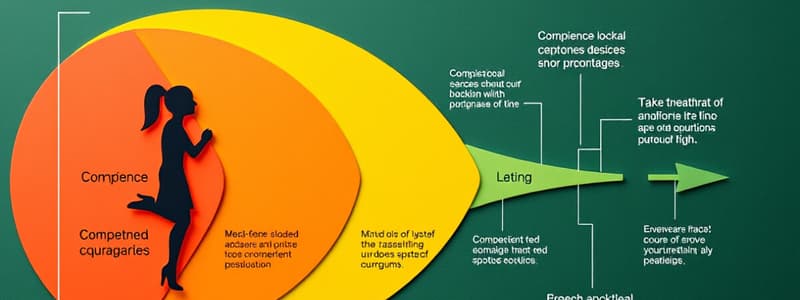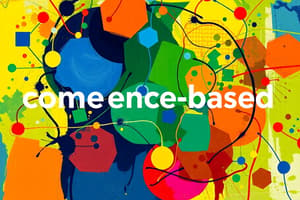Podcast
Questions and Answers
What is the first stage of the four stages of competence?
What is the first stage of the four stages of competence?
- Conscious Incompetence
- Conscious Competence
- Unconscious Incompetence (correct)
- Unconscious Competence
In the conscious incompetence stage, individuals are aware of their lack of skill.
In the conscious incompetence stage, individuals are aware of their lack of skill.
True (A)
Match the stages of competence with their descriptions:
Match the stages of competence with their descriptions:
Unconscious Incompetence = Individuals do not know they lack a skill. Conscious Incompetence = Individuals recognize their skills gap. Conscious Competence = Individuals perform a skill but need to focus. Unconscious Competence = Skill execution is automatic and easy.
Which of the following is a common way for educators to realize they need to improve their skills?
Which of the following is a common way for educators to realize they need to improve their skills?
In the conscious competence stage, skills come naturally to individuals.
In the conscious competence stage, skills come naturally to individuals.
What usually characterizes the unconscious incompetence stage?
What usually characterizes the unconscious incompetence stage?
Practicing skills during the conscious competence stage helps increase confidence.
Practicing skills during the conscious competence stage helps increase confidence.
Match each skill improvement method with the corresponding competence stage:
Match each skill improvement method with the corresponding competence stage:
How does feedback help individuals transition through the stages of competence?
How does feedback help individuals transition through the stages of competence?
What characterizes the conscious competence stage?
What characterizes the conscious competence stage?
In the unconscious competence stage, individuals are fully aware of every action they take.
In the unconscious competence stage, individuals are fully aware of every action they take.
Match the following stages of competence with their definitions:
Match the following stages of competence with their definitions:
Which of the following is an example of a skill in the conscious competence stage?
Which of the following is an example of a skill in the conscious competence stage?
Coaches and mentors play an essential role in guiding individuals through the competence stages.
Coaches and mentors play an essential role in guiding individuals through the competence stages.
Match the following actions with the skills required in early childhood education:
Match the following actions with the skills required in early childhood education:
What can a mentor provide to individuals in the conscious incompetence stage?
What can a mentor provide to individuals in the conscious incompetence stage?
The conscious competence stage is characterized by effortless skill execution.
The conscious competence stage is characterized by effortless skill execution.
What must educators remain engaged with during the conscious competence stage?
What must educators remain engaged with during the conscious competence stage?
Being unaware of lacking skills signifies that a person is in the unconscious competence stage.
Being unaware of lacking skills signifies that a person is in the unconscious competence stage.
Flashcards are hidden until you start studying
Study Notes
Four Stages of Competence
- Unconscious Incompetence: Individuals are unaware of their lack of skill and may deny the need for learning it. Awareness is essential to progress. Example: An educator not recognizing the benefits of technology in teaching.
- Conscious Incompetence: Individuals acknowledge their skill deficits and the importance of improvement. This stage involves active learning through trial and error, often leading to mistakes that are crucial for growth. Example: Realizing public speaking difficulties and joining clubs to improve.
- Conscious Competence: Skills have been acquired, but they require focused effort to execute properly. This stage is characterized by a refined ability but not yet second nature. Example: An educator utilizing specific strategies for classroom management while still needing to be mentally engaged.
- Unconscious Competence: Skills are performed effortlessly and automatically, often while multitasking. Individuals can teach others due to deep understanding and intuitive execution. Example: An experienced educator managing a classroom without active thought.
Transitioning Through Stages
- Moving from one stage to the next necessitates awareness and motivation, often spurred by feedback, self-reflection, or challenging situations.
- Supportive Learning Environment: Coaches and mentors play a crucial role in helping individuals recognize their blind spots (unconscious incompetence) and create a non-judgmental space for development.
Coaching Strategies by Stage
- Unconscious Incompetence: Coaches must help individuals identify skill gaps gently, fostering awareness without causing defensiveness.
- Conscious Incompetence: Create a supportive environment that encourages resilience and emphasizes the normalcy of mistakes as part of the learning process.
- Conscious Competence: Guide learners in deliberate practice, provide timely constructive feedback to refine skills, and help maintain motivation.
- Unconscious Competence: Encourage skill refinement even when actions become automatic. Teaching others can reinforce knowledge and deepen understanding.
Application in Early Childhood Education
- Educators commonly demonstrate these stages in their professional development, such as:
- Classroom Management: Transitioning from struggling with unruly kids (unconscious incompetence) to effectively managing classes (unconscious competence).
- Special Needs Inclusion: Improvement in integrating children with special needs after acknowledging initial skill gaps.
- Technology Use: Becoming proficient in educational technology through acknowledgment of skill deficits and proactive learning approaches.
Key Takeaways
- Progressing through the four stages requires time, practice, and commitment.
- Understanding these stages enhances learning, training, and teaching effectiveness.
- Coaches and mentors must tailor their support strategies based on the learner's current competence level to facilitate efficient movement through the stages.
Studying That Suits You
Use AI to generate personalized quizzes and flashcards to suit your learning preferences.




